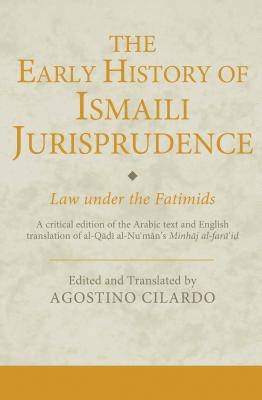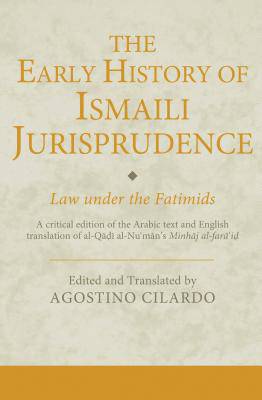
Bedankt voor het vertrouwen het afgelopen jaar! Om jou te bedanken bieden we GRATIS verzending (in België) aan op alles gedurende de hele maand januari.
- Afhalen na 1 uur in een winkel met voorraad
- In januari gratis thuislevering in België
- Ruim aanbod met 7 miljoen producten
Bedankt voor het vertrouwen het afgelopen jaar! Om jou te bedanken bieden we GRATIS verzending (in België) aan op alles gedurende de hele maand januari.
- Afhalen na 1 uur in een winkel met voorraad
- In januari gratis thuislevering in België
- Ruim aanbod met 7 miljoen producten
Zoeken
The Early History of Ismaili Jurisprudence
Law Under the Fatimids
€ 93,45
+ 186 punten
Omschrijving
Researchers have shed light on the literary production of the Ismailis since the early 1930s. The cataloguing of these work has been carried out by Ivanow, Fyzee, Goriawala, Poonawala, Gacek, Cortese and de Bloise. Many works attributable to Ismaili scholars, however, are still unavailable either because they remain hidden in private collections or because they have not survived. Ismaili law, in particular, is still a largely unexplored field of study. Al-Qadi Abu Hanifa al-Nu'man is generally considered the founder and greatest exponent of Ismaili jurisprudence, Many of his works have been lost, and information on some others is scattered; yet other works remain in manuscript form, and only a few have been published. The present book is a critical edition and translation of al-Nu'man's Minhaj al-fara'id, based on its three known copies. It deals with the law of inheritance, one of the most complex in Islamic law.
In comparing the Minhaj with two published works (the Da'a'im al-Islam and Kitab al-iqtisar) as well as a manuscript (Mukhtasar al-athar) of al-Nu'man, a significant doctrinal evolution clearly emerges, reflecting his early Maliki training and then his work under four Fatimid imams. Ismaili law is also compared with the doctrines of the Imami school as well as the legal system of the four Sunni schools. This book thus allows us to determine the time of the composition of the Minhaj al-fara id, the development and the originality of Ismaili jurisprudence, and its relation to other schools of law.
In comparing the Minhaj with two published works (the Da'a'im al-Islam and Kitab al-iqtisar) as well as a manuscript (Mukhtasar al-athar) of al-Nu'man, a significant doctrinal evolution clearly emerges, reflecting his early Maliki training and then his work under four Fatimid imams. Ismaili law is also compared with the doctrines of the Imami school as well as the legal system of the four Sunni schools. This book thus allows us to determine the time of the composition of the Minhaj al-fara id, the development and the originality of Ismaili jurisprudence, and its relation to other schools of law.
Specificaties
Betrokkenen
- Vertaler(s):
- Uitgeverij:
Inhoud
- Aantal bladzijden:
- 208
- Taal:
- Engels
- Reeks:
Eigenschappen
- Productcode (EAN):
- 9781780761299
- Verschijningsdatum:
- 19/03/2013
- Uitvoering:
- Hardcover
- Formaat:
- Genaaid
- Afmetingen:
- 157 mm x 236 mm
- Gewicht:
- 544 g

Alleen bij Standaard Boekhandel
+ 186 punten op je klantenkaart van Standaard Boekhandel
Beoordelingen
We publiceren alleen reviews die voldoen aan de voorwaarden voor reviews. Bekijk onze voorwaarden voor reviews.








